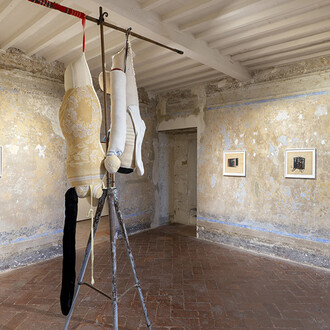In September Galleria Continua celebrates the thirty-fifth anniversary of the opening of its first exhibition space in the medieval town of San Gimignano. A moment that marks over three decades of commitment to dialogue and cultural exchange through contemporary art. Accompanying this celebration, together with the solo shows of Alicja Kwade, Yoan Capote and Michelangelo Pistoletto, is an exhibition dedicated to Chen Zhen, entitled Un village sans frontières. The three founders of Galleria Continua met Chen Zhen for the first time in 1999, on the occasion of his participation in the Venice Biennale; with the artist they established a relationship destined to mark in an indelible way the path and the history of the gallery. It was thanks to him that the founding partners, in 2005, decided to open the first branch abroad (in Beijing) thus beginning a journey, aimed at embracing the world, which continues to this day.
Twenty-five years after his premature passing, Chen Zhen remains a protagonist of our time, an artist who made his work an example of pluralism in art. This exhibition aims to be a homage to his work which, since the end of the 1980s, has substantially contributed to the overcoming of the boundaries between Eastern and Western thought, influencing an entire generation of artists.
Initially interested in painting, in 1989 Chen Zhen began to work on installations: he reassembled everyday objects creating works in which Chinese tradition is mixed with consumer society in a synthesis that today is prophetic. He defined “trans-experience” as the soul of his work: a union of “residence” (adapting to places), “resonance” (dialogue with the other) and “resistance” (to new cultural influences). In a conversation with his alter ego, Zhu Xian, he explains that trans-experience is not a conceptual theory but an experiential method that connects what precedes to what follows, adapting to change, accumulating experiences and activating at any moment. This concept is linked to central themes: immersion of the self in life, identification with others, exchanges and conflicts between people, society, nature, science and technology. What interests him most are these “networks of relationships.”
Chen Zhen’s entire production is marked by his personal story, linked to an autoimmune disease diagnosed at only twenty-five years old. Deeply affected by the news, he spent three months in Tibet living together with monks a simple lifestyle detached from the material dimension. This experience, which influenced his perception of the value of time, placed at the center of his research the investigation of the different approaches of Eastern and Western medicine. The renewed sensitivity of Chen Zhen toward the human body and the will to make his work a therapeutic and purifying act emerges in several works centered on physical elements, including the internal organs.












